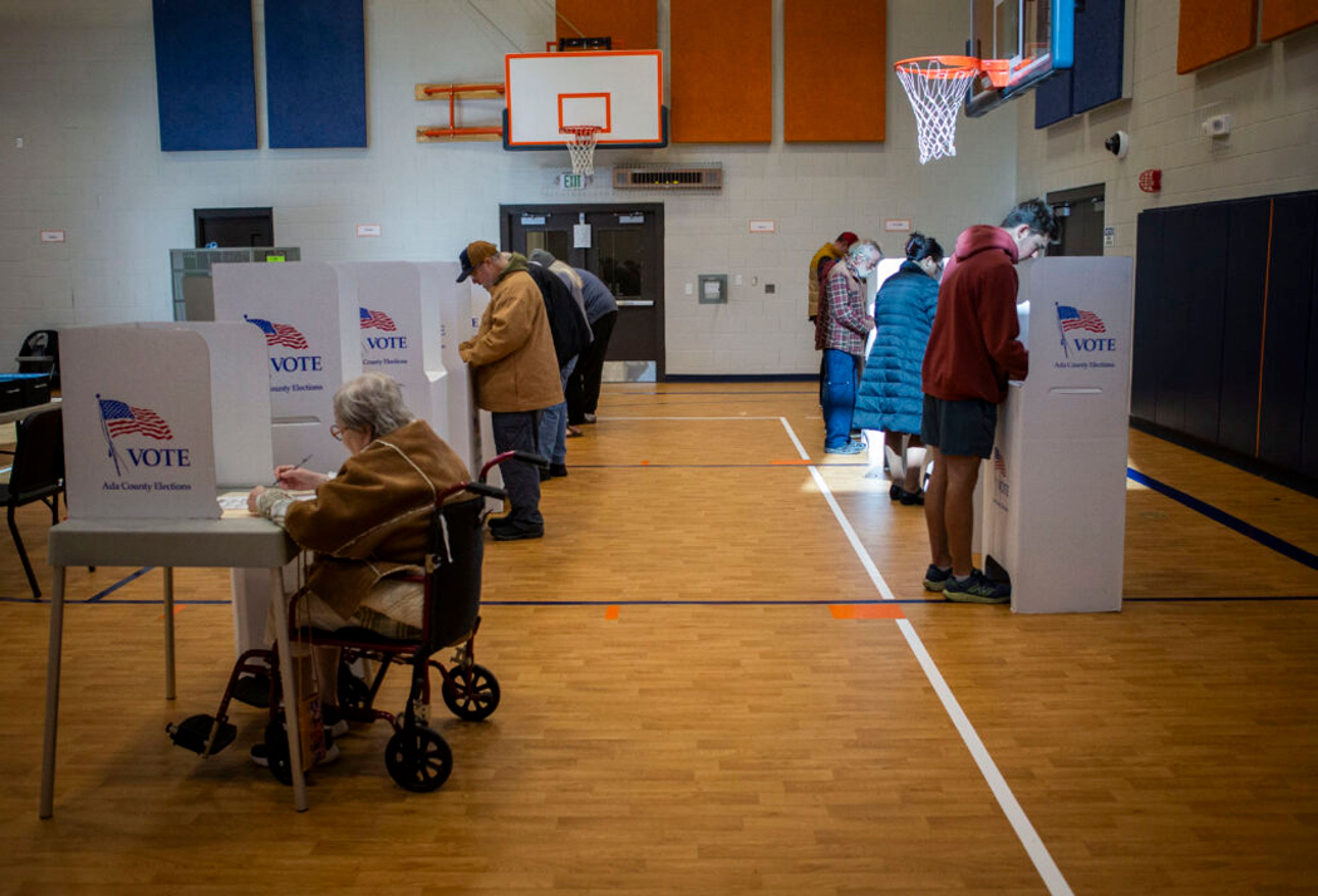Idaho awaits word on Medicaid expansion plan
But federal government’s response to added restrictions lawmakers placed on citizen initiative could take months
Idaho officials could hear in the next few weeks whether a voter-approved plan to expand Medicaid eligibility has been accepted by the federal government.
It will take several more months, however, to learn the fate of the work requirements and other restrictions state lawmakers adopted during the 2019 legislative session.
Deputy Director Lisa Hettinger with the Idaho Department of Health and Welfare noted that an amended state plan was submitted to the federal Centers for Medicare and Medicaid Services in February.
The proposal seeks to expand Medicaid eligibility to include all adult Idahoans earning less than 138 percent of the federal poverty level.
Hettinger, who oversees the department’s Medicaid Division, said federal officials have 90 days to make a decision regarding the amendment, or provide a list of questions that need to be answered before they can act.
That clock started once the plan was received, she said, so “we should hear something no later than the end of (May).”
There have been some informal communications with federal officials since February, Hettinger said. At this point, she doesn’t foresee any major hiccups.
“Nothing is routine when you’re dealing with Medicaid, but this is a fairly straightforward plan amendment,” she said. “I don’t anticipate any challenges.”
Voters approved the expansion last fall, after six years of inaction on the part of the Idaho Legislature. Assuming the federal government signs off on it, people can start signing up for the program Nov. 1, with services scheduled to begin Jan. 1.
The timeline for work requirements, by comparison, is much more uncertain.
“Unlike a plan amendment, there’s no clock for a waiver application decision,” Hettinger said. “At some point they do need to respond, but there’s no federal rule defining when that will be.”
Lawmakers imposed a number of conditions and restrictions on Medicaid expansion during the final week of the 2019 session. Some serve primarily as guidance to the Department of Health and Welfare, while others, including a 20-hour-per-week work requirement, must be approved by the federal government.
Hettinger said the health department hopes to submit those waiver applications sometime in the July to September time period.
“We’re in conversations with the governor’s office and with CMS,” she said. “We’re at a point where we need to evaluate each component. There were four very different things the Legislature asked us to do, so we’re talking with CMS about what’s an appropriate approach.”
Part of the discussion includes whether a single application should be submitted, encompassing all the restrictions, or if they should be split into multiple applications.
A waiver is essentially a contract between the state and federal government, one that lets the state to do things that otherwise aren’t allowed under federal statutes.
“Right now we’re at the beginning of contract negotiations,” Hettinger said. “Engaging with them (federal officials) is a normal part of the process.”
Another major difference between plan amendments and waivers, she said, is that each waiver application goes through a minimum 30-day public comment period at both the state and federal levels.
“We already have a lot of folks who have asked us to please make sure they’re notified,” Hettinger said.
The Department of Health and Welfare will announce any state-level comment period through legal ads in newspapers, as well as by posting a notice on its website.
The agency also has an “Idaho Medicaid Expansion” link on its home page, which provides updates on the process, as well as answers to frequently asked questions and other information.
The link, https://medicaidexpansion.idaho.gov, will be updated regularly, as more information is available.
Once the comment period closes, Hettinger said, any input becomes part of the waiver application. That includes any requests for changes, as well as the department’s response to such requests.
The public comment section “is often the longest part of any waiver application,” she said.
After a waiver is submitted to the Centers for Medicare and Medicaid Services, federal officials have 15 days to determine if the application is complete. If it is, that triggers a subsequent 30-day comment period at the federal level.
“Then we wait,” Hettinger said.
CMS could ask for changes to a waiver, she said, but it can’t force the state to accept them. It really is a contract, so “we need to agree to any changes.”
Moreover, because state lawmakers approved the specific waiver requests, it’s possible they would have to approve any changes that federal officials propose.
“If it’s an innocuous change, we could just ask CMS if it’s critical and they might withdraw it,” Hettinger said. “Whether the Legislature needs to weigh in depends on how severe a departure (the proposed change) is from what’s in statute.”
If federal officials make it clear they won’t approve a waiver without major changes, she said, it’s possible the state would need to withdraw its application and start the process all over, after getting more guidance from legislators during the 2020 legislative session. That decision, however, would not be made by the Department of Health and Welfare alone.
“We would be talking with the governor’s office and possibly legislative leadership,” Hettinger said.
Lawmakers also imposed several conditions on Medicaid expansion that don’t require federal approval.
For example, they adopted language barring the implementation of any waiver that would saddle the state with more than 10 percent of the total costs. They also want all Medicaid expansion participants placed in a care management program, to help coordinate their medical care; want information to be collected regarding potential substance abuse issues, so people can be referred for treatment; and approved a requirement that the House and Senate Health and Welfare committees review Medicaid expansion by Jan. 31, 2023, to determine whether the program should be continued.
The four waivers that do need federal approval include:
A 20-hour-per-week work requirement, which can be satisfied through a combination of work, volunteer service and participation in a job training program.
The requirement includes multiple exemptions, including people younger than the age of 19 and older than age 59, pregnant women, those who are physically or intellectually unable to work, parents with children younger than the age of 18, students attending school at least half time and those who are caring for someone with a serious medical condition or disability.
According to the Kaiser Family Foundation, the Trump administration signaled its support for work requirement waivers in January 2018. Since then, at least nine waiver applications have been approved, with six more pending. However, court challenges have delayed implementation or struck down such waivers in all but two states, Indiana and New Hampshire.
Language giving people who earn 100 to 138 percent of the federal poverty level the option to purchase subsidized health insurance through the state exchange, rather than go on Medicaid.
To date, federal officials haven’t approved waivers of this type. Historically, they’ve required all waivers to be cost-neutral, meaning they don’t cost the federal government any more than if the waiver hadn’t been approved.
It’s unclear if Idaho’s request would be cost neutral, given that the federal government picks up 100 percent of the cost of any health insurance subsidies, compared to just 90 percent of the cost of Medicaid services.
A waiver allowing private mental health facilities to receive Medicaid payments when providing substance abuse and mental health services to Medicaid-eligible patients.
Several waivers of this type have previously been approved, specifically for substance abuse services. As recently as November, the Trump administration indicated it was open to approving waivers for adult mental health services.
Language prohibiting traditional and expanded Medicaid participants from receiving family planning services or supplies from outside providers without a referral from their medical home.
Although lawmakers presented this as a cost-saving measure, opponents suggested it was yet another Republican attempt to de-fund Planned Parenthood.
Kaiser Family Foundation indicates that three states — South Carolina, Tennessee and Texas — have submitted similar waiver applications. All three are still pending.
Spence may be contacted at bspence@lmtribune.com or (208) 791-9168.








